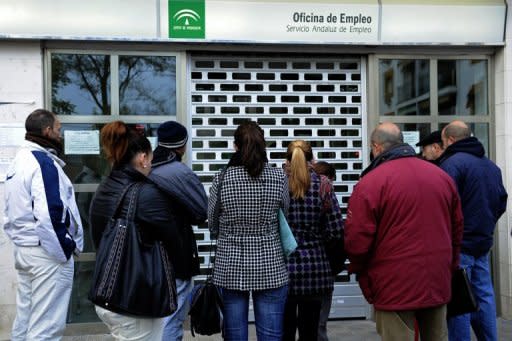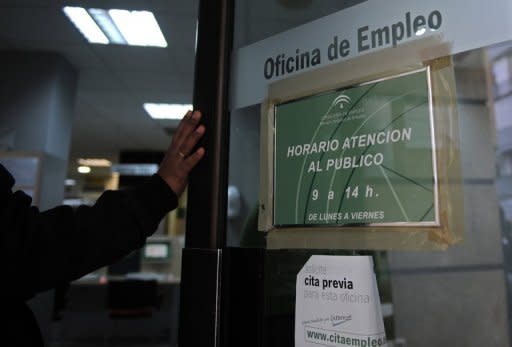Spanish jobless rate soars to record 24.4%
Spain announced on Friday that its jobless rate surged to a record 24.4 percent at the end of March, pounding financial markets already reeling from a Spanish sovereign debt downgrade. A total 5.64 million people searched in vain for work in the recession-bound, deficit-plagued economy, the National Statistic Institute said. Already, Spain had the highest unemployment ratio in the industrialized world, as the slumping economy failed to absorb the millions of workers cast out of jobs when a property bubble imploded in 2008. In a climate of recession, compounded by a renewed zeal for austerity to rein in the deficit and curb mushrooming debt, the jobs market deteriorated dramatically. The unemployment rate soared to 24.44 percent of the potential workforce at the end of March from 22.85 percent three months earlier, the National Statistics Insitute report showed. Some 365,900 jobs were destroyed in the first quarter of the year, pushing the unemployment rate to its highest level since records began in their existing format in 1996, it said. Hours earlier, Standard and Poor's downgraded Spain's sovereign credit rating to BBB-plus and added a negative outlook, warning of recession this year and next, making it even harder to meet deficit-cutting targets. At the same time, the government was increasingly likely to have to pump in funds to help banks, many of which are still burdened by non-performing loans extended during the property bubble, the agency said. A credit rating downgrade tends to deepen concerns among investors who in turn demand higher returns. If borrowing costs become unsustainable for a state, it can be forced to seek a rescue. The jobless surge combined with the debt downgrade sent the Madrid stock market's leading IBEX-35 index down 100.50 points, or 1.43 percent, to 6,926.60 in morning trade. Spain's benchmark 10-year government bond weakened. The yield -- or the rate investors demand in return for handing over their money -- rose to 5.945 percent from the previous day's close of 5.82 percent. The Bank of Spain had warned this week of a worsening employment market when it concluded that the country had plunged back into recession at the end of last year. Gross domestic product fell an estimated 0.4-percent in the first quarter of 2012 after a 0.3-percent decline in the last three months of 2011, the central bank said. "In Spain today a cycle similar to Greece is starting to develop. The recession is so deep that when you take one step forward on austerity, it takes you two steps back," said HSBC chief economist Stephen King. Prime Minister Mariano Rajoy's conservative government has nevertheless vowed to slash the deficit -- the annual shortfall of income to spending -- to 5.3 percent of economic output in 2012 and 3.0 percent in 2013. The deficit hit 8.5 percent of output in 2011, shattering the target by 2.5 percentage points. Many doubt the Spanish government can meet these new deficit goals, however, especially during the recession, which tends to lower income from taxes and to raise welfare costs. "In our opinion, these targets are currently unlikely to be met given the economic and financial environment," Standard & Poor's said, forecasting instead a deficit of 6.2 percent of economic output for this year and 4.8 percent in 2013.



